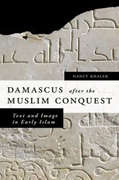
In Damascus after the Muslim Conquest, Nancy Khalek demonstrates that the changes that took place in Syria during the formative period of Islamic life were not a matter of the replacement of one civilization by another as a result of military conquest, but rather of shifting relationships and practices in a multi-faceted social and cultural setting. Before it fell to Muslim armies in AD 635-6 Damascus had a long and prestigious history as a center of Christianity. How did the city, which became capital of the Islamic Empire, and its people, negotiate the transition from a late antique, or early Byzantine world to an Islamic culture? In this innovative study, Nancy Khalek demonstrates that the changes that took place in Syria during the formative period of Islamic lifewere not a matter of the replacement of one civilization byanother as a result of military conquest, but rather of shifting relationships and practices in a multi-faceted social and cultural setting. Even as late antique forms of religion and culture persisted, the formation of Islamic identity was effected by the people who constructed, lived in, andnarrated the history of their city. Khalek draws on the evidence of architecture, and the testimony of pilgrims, biographers, geographers, and historians to shed light on this process of identity formation. Offering a fresh approach to the early Islamic period, she moves the study of Islamic origins beyond a focus on issues of authenticity and textual criticism, and initiates an interdisciplinary discourse on narrative, story-telling, and the interpretations of material culture. Chapter One: Narrative and Early Islamic HistoryChapter Two: Telling Stories: Historical Writing in Early Islamic SyriaChapter Three: John the Baptist and Sanctified Spaces in Islamic SyriaChapter Four: Iconic Texts: Damascus in the Medieval ImaginationAfterword
- ISBN: 978-0-19-973651-5
- Editorial: Oxford University
- Encuadernacion: Cartoné
- Páginas: 224
- Fecha Publicación: 13/10/2011
- Nº Volúmenes: 1
- Idioma: Inglés
